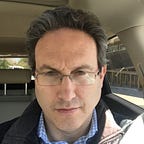Diagnosed at 48
There are two defining stories about my life which (I realize now) intersect with each other.
Defining Story #1: The Hyperactive Slob
This is family lore — but also true. As a kid my energy level was absurd. As a toddler, I would open a dresser drawer and throw its contents out on the floor. If know my mother, you can feel the exquisite torture this was. A rat recently found its way into my parents house and I am not exaggerating when I tell you that it died of hunger — not a crumb to be found.
In addition to a near catastrophic tendency toward messiness, my energy level was off the charts. I could play dodgeball or kill-the-carrier, or chase my cousin Paul around the house for hours. I would routinely return to class after gym in elementary school drenched in sweat. I would chase Paul’s family Cadillac down the street for a full block, feeling distress that my chaos partner was heading back to Hartford.
Despite this level of activity, I actually did really well in school. Although that, and many other things, changed at 12 or 13 years old.
Defining Story #2: Unfocused underachievement
As puberty raged in, the hyperactivity began to diminish. And the ability to focus, be self-directed, complete tasks and study independently began to have consequences. My grades dropped steadily until they leveled out at mediocre. Unless I was uniquely interested in what I was doing or under a tremendous amount of pressure to perform, I would do the very minimum I needed to do to get by. I simply could not marshal the resources necessary to focus.
I skated through high school with an 86 average. I set records (unofficial) for the number of times I was late to high school my senior year. I was lucky to find debate club and, despite my poor work ethic, and thanks in great part to being partnered with one of the greatest high school debaters ever, we we were national champions. I did love to argue, I could talk wicked quickly, and I was competitive — so that kept me engaged enough to apply myself. It also took me away from school on a regular basis — which I found unbearably boring.
I did well at Macalester College. I did well at the University of Michigan. And I have done well in my career. But over the years, I have consistently left an awful lot of potential on the table. I could not keep my attention focused on things that did not require immediate attention. If I started a work week with 5 things due on Friday, I would procrastinate, dither, be unproductive, check social media, take a nap, or do less important tasks until Thursday — rather than focus on the things that were both the most important and that required the most sustained mental effort.
This feeling of underachievement is best explained by a recurring dream I have had most of my adult life. In it, I am one credit short of graduating from high school, college, or graduate school. The dream fills me with panic and shame. And I have had that dream so often that when I am awake I sometimes have the feeling that I am ACTUALLY a credit short of something. I am not. But if I was, graduate school was over 25 years ago so that ship has sailed.
The Diagnosis
The constant frustration and feelings of inadequacy reached a peak about in 2016. I was one of four partners in my consulting firm. My desire to see this business thrive, to serve my clients and my personal desire to grow and mature has increased. But my ability to take that desire and put it into action was failing.
Then an idea entered my brain via a conversation with a neighbor. She and I were talking about her son who had been diagnosed with ADHD. Her 40 year old brother, in learning about the ADHD, had realized that he shared many of those symptoms and had gotten a formal diagnosis. It was a huge relief for him. And that story made me wonder.
It took me a while but I eventually sought out some help. It is not easy to find qualified adult ADD professionals in Nashville. I found an amazing psychiatrist who had recently relocated from the DC-area to Nashville (just like us). I’ll write more about this in future installments but long story short: after much trial and error we have landed on a medication that does help. Given the years of poor work and focus habits I have developed, it is not a cure all by any means. But it has allowed my head to clear, to bring some focus to my work and has restored my enthusiasm for my work and an increased confidence in my abilities.
I worked with a talented ADD Coach which brought new layers of awareness, understanding, strategies and tactics. It has also brought me an awareness of the benefits of ADD. My attention constantly shifting has developed my ability to pull in lots of information, synthesize it and make connections. My tendency to get overwhelmed by information has, by necessity, led to my skill at creating lucid and clear descriptions of complex topics and to be able to communicate those to others.
I am the combination of my genes, my experiences, my choices and the love and help that has been given to me by my family, friends and the larger community. Learning about ADHD has allowed me to find a piece of the puzzle that I for years thought was laziness, lack of motivation or lack of ability. The medication helps. But it is my job to find ways to leverage that new help to become more effective.
